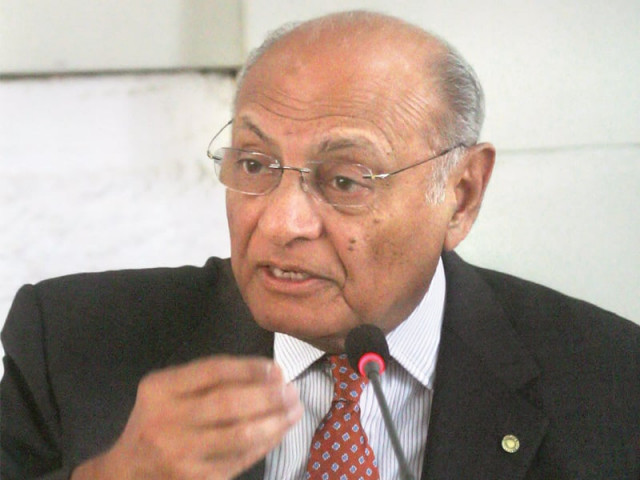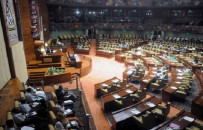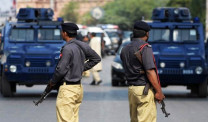AKUH’s founding president takes a trip down memory lane
Shamsh Kassim Lakha addressed a packed auditorium at the university on Tuesday.

“When Imran Khan was building Shaukat Khanum Hospital, he came to me five times asking how we built AKUH. And we taught him how.” Lakha recalled.
“We didn’t want to create an island of intellectuals,” he explained, adding that he wanted other people and institutes to be inspired by their example.
“When Imran Khan was building Shaukat Khanum Hospital, he came to me five times asking how we built AKUH. And we taught him how.” Lakha recalled how AKUH was the only private university east of the Suez Canal till Japan when it was built. “Today there are 60 private universities in Pakistan.”
He went on to name a number of people who played an instrumental role in the early years of the hospital. Five men, who included President Lakha, Muhammed Jaffer and Ramzan Merchant, were made part of an ‘Owner’s Representative Board’, which worked for nine years to plan out the hospital building and saw the construction through. “Back in 1977, Aga Khan, the religious leader of the Ismaili community who paid for the construction of the hospital, told us that he was going to give us a free reign in how we built it,” said Lakha. “The one instruction he gave us was to make this hospital as clean as a Swiss hotel. ‘You should be able to see your face on the floor, he told us.’”
Lakha explained how they conducted a meticulous search to find people for the team. The university’s first dean, Dr Cheves Smythe, had just completed his term at Texas Medical College, US, when Lakha called him. “He didn’t even know who Aga Khan was or where Karachi was on the map but I convinced him to join us.” Winnie Warkinton, the first director of the school of nursing, came from Manitoba, even though she had never stepped outside it before.
Gender equality
Lakha narrated an argument the team had over appointing a female surgical chair. “I remember insisting that if a woman is qualified enough to lead the surgical department, then she should be given a chance.” Making the college into a teaching institute and starting off with a nursing programme were inspirations they drew from the realisation that women dominated these two areas. “Today, 66 per cent of our student body and 53 per cent of our faculty are women,” he claimed proudly.
Setting values
The founding team made sure they set proper guiding principles for those who follow. “Accepting ‘gifts’ from the countries where we would go to buy equipment for the hospital was strictly banned,” he gave an example. Lakha recalled one of the team members being given a Toshiba cigarette lighter while he was shopping for the hospital in Japan which he returned. “We heard later that the vice-president of the company advised his people to trade with us because we could not be bought.”
Honesty was another important value they stressed on. “We only hired people who were thoroughly honest. You can’t be somewhat honest, just like you can’t be somewhat pregnant.”
The university’s first graduates came from the nursing school. Lakha admitted that they were not the best at first.
“A nurse is like a young bride who knows her mother-in-law will judge her cooking skills. Our nurses were like that,” he said, adding that they came on par with international standards after they developed their skills.
History of the institution
Aga Khan announced that he was going to build ‘Aga Khan Hospital and Medical College’ in 1964. He made three requests to the government: to give land, to offer some fiscal concessions and to allow the building’s architecture to be Islamic.
The founding president, Shamsh Kassim Lakha, recalled how all these conditions were fulfilled over time. “We were initially offered six acres and then 20 acres. After three years of bargaining, we settled on 64 acres with the government.”
After that, they brought together Iranian, American and Pakistani architects and sent them on a tour of Muslim countries. They travelled to Syria, Turkey, Egypt and Spain and brought the magic of Muslim architecture back to Pakistan.
Lakha also spoke about the time it took for the dream of a private university to become a reality. “In 1971, the foundation of the college was laid by President Yahya Khan. The frequent regime changes and the problems we faced in getting reliable contractors for the project set us back,” he explained. “At one point, the entire plan for the project had to be redesigned to incorporate seismic resistance and build bomb proof shelters.” The construction finally began in 1981. In 1983, the medical college was inaugurated. Now, the university has 19 buildings that were built with the help of donations worth $ 95.6 million.
Calls for favours: ‘What? No siffarish?’
Like any other education institution, AKUH’s founding president Shamsh Kassim Lakha received his fair share of calls for favours. “People would call me up and say: I am so and so minister. My niece is a very bright young thing,” he recalled. “Everyone, including government officials, our staff and generous donors from the Ismaili community expected favours.”
His admissions team learnt, however, to never say no to the big guys. The management also invited prominent members of the Ismaili community to decide whether or not to put a quota in place for the Ismalis. “At one point in the meeting, I asked them: If we have a quota, who decides whether it will be the daughter of the sweeper or the daughter of the jamaat’s president who gets in?” After that, they agreed that admissions should be on the basis of merit.
Published in The Express Tribune, March 27th, 2013.



















COMMENTS
Comments are moderated and generally will be posted if they are on-topic and not abusive.
For more information, please see our Comments FAQ